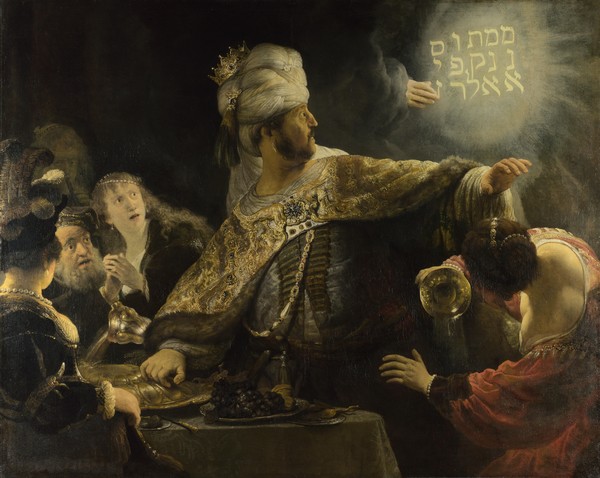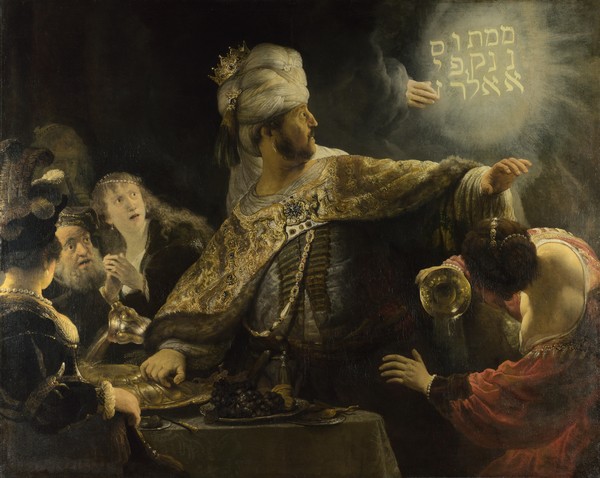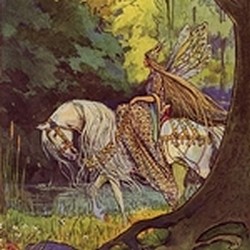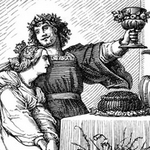
“Belshazzar the king made a great feast to a thousand of his lords, and drank wine before the thousand.”
Thus begins chapter 5 of the Book of Daniel in the Old Testament: with a great feast. Besides the king, of course, the thousand lords, their wives and their concubines drink. And you know how these things work: the king talks more than enough, the lords humour him, the situation goes further and Belshazzar ends up by making two mistakes. The first is quite serious: he commands to bring the golden and silver sacred vessels that his father Nebuchadnezzar took from the temple in Jerusalem, and everybody drinks from them. The second mistake, even worse: he praises "the gods of gold, and of silver, of brass, of iron, of wood, and of stone." That is, all sort of gods except the one God.
Then, someone’s hand appears and writes signs on the wall that no one present can decipher. Terrified, Belshazzar asks the wisest men, who can't either interpret the words. Then, the queen (who for some reason wasn't at the feast) suggests calling Daniel, who was greatly respected by Nebuchadnezzar, his former “master of the magicians, astrologers, Chaldeans, and soothsayers". Daniel lives up to his prestige, he reads what the hand had written: “MENE, MENE, TEKEL, UPHARSIN” and explains it in the prophets' cryptic way. To make it shorter, these words warn Belshazzar that he will soon lose his kingdom which will be divided between his enemies. Indeed, "In that night was Belshazzar the king of the Chaldeans slain." Thus ends the chapter.
In 1820, Heinrich Heine wrote his version of this story, a long poem composed of twenty-one couplets, which tells of the king’s arrogant carelessness and his terror in realizing how serious blasphemy was. The poet doesn't talk about Daniel and the message on the wall remains unexplained but, inexorably, Belshazzar is killed that night. The poem alone deserves careful reading (obviously, it's from Heine), but thanks to Robert Schumann’ music it became a great ballad, which, in my opinion, should be better known. It was composed in February 1840, so Belsatzar is also one of the first Lieder he wrote that Liederjahr.
The music starts fairly slow, Babylon is sleeping. The time indication is "Im Anfang nicht zu schnell, nach und nach rascher" [At the beginning not too fast, progressively accelerating], the tempo goes faster as the narrative tension rises. The first musical strophe lasts eight couplets; at the feast, everyone drinks a lot and unwittingly celebrates the excesses of the king. The second musical stanza tells how the king, out of control, blasphemes. It's the only time that the narrator lets the king talk, and Schumann doesn't waste the dramatic force of that moment, the sentence "Ich bin der König von Babylon" (I'm the king of Babylon) is the key point of the Lied.
After these words, the third stanza begins. Even drunk, Belshazzar realizes he has gone too far, and is scared. A brief interlude, the echo of the sentence we've just heard, makes us notice the silence in the hall. The hand apparition terrifies everybody. The narrator calls our attention: “Und sieh! Und sieh!" [And look, look!], and then, he says the hand "schrieb und schrieb" [it wrote and wrote], as if instead of four words, it had filled the whole wall, so long that moment should have seemed. Schumann slows these phrases, and this, along with the silence that ends the stanza, prepares us for the end of the story. The last couplets are very slow; the indication is "In langsameren Tempo, leise und deutlich zu rezitieren" [In slower times, recite clearly and quietly]. The piano, which had described at the beginning the liveliness of the feast, now almost disappears, only a few chords emphasize the narrator words.
Note that despite not being a strophic lied (musical verses have different lengths, respectively, eight, five, four and four couplets), Schumann makes us to believe so by repeating at each beginning the first measures of the vocal line; this means that we globally perceive it as music already heard, even if it is not really true. As I said before, I think it's a great song, and a good storyteller (both singer and pianist together) will make us not want to miss a single word of that story. I have chosen the recording of Konstantin Krimmel and Doriana Tchakarova; the baritone is only twenty-six, but he has the natural gift of saying Lied, as we know the lucky ones who have already heard him. I hope you enjoy his version as much as I do.
Die Mitternacht zog näher schon;
In stummer Ruh’ lag Babylon.
Nur oben in des Königs Schloß,
Da flackert’s, da lärmt des Königs Troß.
Dort oben in dem Königssaal
Belsatzar hielt sein Königsmahl.
Die Knechte saßen in schimmernden Reihn,
Und leerten die Becher mit funkelndem Wein.
Es klirrten die Becher, es jauchzten die Knecht’;
So klang es dem störrigen Könige recht.
Des Königs Wangen leuchten Glut;
Im Wein erwuchs ihm kecker Mut.
Und blindlings reißt der Mut ihn fort;
Und er lästert die Gottheit mit sündigem Wort.
Und er brüstet sich frech, und lästert wild;
Die Knechtenschar ihm Beifall brüllt.
Der König rief mit stolzem Blick;
Der Diener eilt und kehrt zurück.
Er trug viel gülden Gerät auf dem Haupt;
Das war aus dem Tempel Jehovas geraubt.
Und der König ergriff mit frevler Hand
Einen heiligen Becher, gefüllt bis am Rand.
Und er leert’ ihn hastig bis auf den Grund
Und rufet laut mit schäumendem Mund:
Jehova! Dir künd’ ich auf ewig Hohn,—
Ich bin der König von Babylon!
Doch kaum das grause Wort verklang,
Dem König ward’s heimlich im Busen bang.
Das gellende Lachen verstummte zumal;
Es wurde leichenstill im Saal.
Und sieh! und sieh! an weißer Wand
Da kam’s hervor wie Menschenhand;
Und schrieb und schrieb an weißer Wand
Buchstaben von Feuer, und schrieb und schwand.
Der König stieren Blicks da saß,
Mit schlotternden Knien und totenblaß.
Die Knechtenschar saß kalt durchgraut,
Und saß gar still, gab keinen Laut.
Die Magier kamen, doch keiner verstand
Zu deuten die Flammenschrift an der Wand.
Belsatzar ward aber in selbiger Nacht
Von seinen Knechten umgebracht.
Midnight drew nearer already;
In mute rest lay Babylon.
Only above, in the king's castle,
lights are flickering and the king's retinue makes noise.
And above, in the king's hall,
Belshazzar holds his royal banquet.
The knights sat in shimmering rows,
emptying goblets of sparkling wine.
The goblets clinked, the knights cheered;
and so they made noise for that headstrong king.
The king's cheeks glowed;
through wine his courage grew bolder.
And blindly, his courage pulled him forward,
and he maligned God with blasphemous words.
And he boasted impertinently and blasphemed wildly
while the crowd of knights bellowed their approval.
The king called with a haughty glance;
the servant hurried off and soon came back.
He brought back on his head many golden treasures
that had been plundered from Jehovah's Temple.
And the king grasped with his criminal hand
a sacred goblet and filled it to the brim.
And he drained it hastily to the bottom,
and then called loudly with foaming mouth:
"Jehovah! I proclaim to you my eternal scorn,
for I am the king of Babylon!"
But hardly had those terrible words died away,
when the king grew secretly fearful in his heart.
The ringing laughter fell silent at once;
the hall grew deathly still.
And behold! behold! on the white wall
there appeared something like a human hand;
and it wrote and wrote on the white wall
letters of fire; it wrote and disappeared.
The king sat staring there,
with knocking knees, pale as death.
The crowd of knights sat cold and filled with horror,
and sat entirely still, without a sound.
Magicians came, but no one could understand
and find the meaning of the flaming script on the wall.
But Belshazzar, that very night,
was murdered by his knights.
(translation by Emily Ezust)



 Carl Lo...
Carl Lo...
 The Kin...
The Kin...









